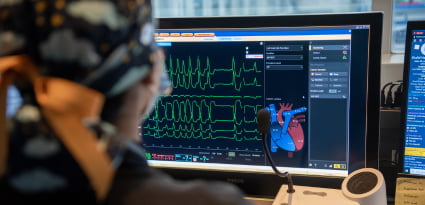
JHAH research suggests AI-enhanced medical imaging can help detect early-stage heart disease in cancer patients
A paper on AI-enhanced cardio-oncology imaging for cardiotoxicity, drafted by the JHAH Research Office, has been published in JMIR Cancer, a leading medical journal.
A scientific paper by researchers at Johns Hopkins Aramco Healthcare (JHAH) about the use of artificial intelligence (AI) in cancer care has been published in a leading medical journal.
The paper explores how AI can enhance medical imaging and help clinicians to predict whether cancer patients are at risk of suffering from heart disease. It concludes that AI can help detect heart disease earlier and improve outcomes among cancer patients, while calling for further research in the field.
The paper, drafted by JHAH’s Research Office, appears in the latest edition of JMIR Cancer, a globally respected, peer-reviewed journal that focuses on education, innovation, and technology in cancer care, cancer survivorship, and cancer research.
This year, JHAH is opening a state-of-the-art Oncology Center of Excellence that will set the benchmark for specialized cancer care in the Gulf region. Official projections indicate that cancer cases in the GCC will jump by 140% between 2020 and 2040.
The JHAH study involved a systematic review of existing literature on predicting cardiotoxicity — heart damage caused by cancer treatments — using medical imaging enhanced by AI.
Dr. Hayat Al Mushcab, JHAH Research Office Lead, said: “AI is already being used in medical imaging to improve patient care but the use of AI in cardiotoxicity prediction is a relatively new field. We decided it was an important field that warranted further exploration, and we are delighted to contribute to the evolving literature.
It is early days, but our research suggests that AI-enhanced imaging for cardiotoxicity prediction can be applied effectively in a hospital setting. This could save the lives of cancer patients with undetected cardiotoxicity, dramatically improve their outcomes, and reduce costs for healthcare providers.
Dr. Al Mushcab suggested that AI could also be used to interpret a cancer patient’s medical records to determine whether they are at higher risk of cardiotoxicity.
AI is proving to be a vital tool for enhancing medical research and improving patient care. AI and machine learning models can analyze huge quantities of information, such as patient health records, clinical trial data, and medical images, in a fraction of the time it takes humans. This is opening new fronts in medical research and helping clinicians to devise new techniques.
Predicting cardiotoxicity in cancer patients is important because cancer treatments can put them at higher risk of developing heart disease. One study suggests that treatment by chemotherapy, radiotherapy, and targeted agents creates a one in five chance that a patient will develop cardiac dysfunction[i].
Cardiotoxicity in cancer patients is investigated using several medical imaging techniques. The most common is echocardiography, whereby ultrasound waves are used to create moving images of the heart. A more advanced technique is cardiac magnetic resonance imaging (MRI), where detailed images of the heart are created using strong magnetic fields and radio waves. Another advanced technique is cardiac computed tomography (CT), which uses X-rays and computer software to create a detailed 3D model of the heart.
A drawback of echocardiography is that the resulting images can be of poor quality, and the interpretation of these images by clinicians can be highly subjective. Meanwhile, MRI and CT imaging is expensive and is not always immediately available to patients.
The JHAH researchers say that AI has been deployed effectively to enhance echocardiograph images, helping clinicians to more accurately assess cardiotoxicity in cancer patients. Further, it has helped clinicians to predict early-stage cardiotoxicity that would not typically be detected by traditional echocardiographs.
“The future of imaging AI in cardio-oncology holds substantial promise,” the researchers say in the paper. A convergence of cutting-edge technologies such as molecular imaging, wearable devices, and predictive modelling “is poised to transform cardiotoxicity management in cancer patients.”
They continue: “These advancements enable early detection and personalized risk assessment and promise targeted interventions, ultimately enhancing patient outcomes and survivorship. This future trajectory in imaging AI aligns with the significant advancements witnessed from machine learning to deep learning in artificial intelligence, revolutionizing robotics and autonomous systems’ capabilities and enabling them to perceive, learn, and adapt with increased efficiency and accuracy in complex environments.
“These models, leveraging AI algorithms trained on diverse patient cohorts and multi-modal imaging data, could assist clinicians in formulating proactive strategies for long-term cardiac care in cancer survivors, thereby enhancing overall cardiovascular health and quality of life.”
However, the researchers caution that the evidence base for AI imaging solutions for cardiovascular care in general, and predicting cardiotoxicity in particular, is limited. They call for further research in the field, such as “larger, multi-center trials to validate AI applications in diverse patient populations and to refine these technologies for routine clinical use,” and suggest that “multiple massive datasets be combined either retrospectively or prospectively” to improve the machine learning process and the training of AI models.
The paper, entitled Application of Artificial Intelligence in Cardio-Oncology Imaging for Cancer Therapy-Related Cardiovascular Toxicity: Systematic Review, is available to read online.
[i] https://pubmed.ncbi.nlm.nih.gov/34234558/
